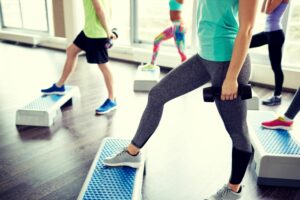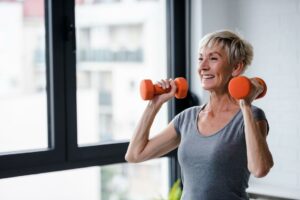As we age, it’s important to keep up with our physical activity to maintain our overall health and well-being. Though we may not be as active as we once were in our youth, there are still many exercises we can do to stay healthy as we age. In this blog post, we will explore some of the best exercises for healthy aging. From cardio to strength training and more, read on to learn what you can do to keep your body moving as you age.
Contents
The Best Exercises for Healthy Aging

The best exercises for healthy aging are those that keep you active and engaged. There are many different ways to stay active, so find something that works for you and stick with it. Regular physical activity can help reduce your risk of developing chronic diseases such as heart disease, stroke, and diabetes, and can also help improve your mood and mental health.
Here are some ideas for exercises that can help you stay healthy as you age:
Walking
One of the best exercises for healthy aging is walking. Walking is a low-impact activity that can help improve your cardiovascular health, strength, and balance. It is also easy to do and doesn’t require any special equipment. If you can, aim to walk for at least 30 minutes each day.
Walking makes one of the best exercises for seniors. It is a low-impact cardio workout that also strengthens bones and muscles. These also help with balance and coordination
Swimming
Swimming is another great exercise for aging adults. It is a low-impact activity that provides a full-body workout. Swimming can help improve your cardiovascular health, flexibility, and muscle strength. If you don’t have access to a pool, you can also try water aerobics or aqua therapy.
Swimming is also a great exercise for seniors for the same reasons as walking—it’s low-impact and provides many health benefits. Swimming can also help with arthritis pain and has been shown to improve sleep quality.
Aerobic Exercises

Aerobic exercises are any activity that gets your heart rate up and makes you breathe harder. Some examples of aerobic exercises include brisk walking, jogging, cycling, and dancing. Aerobic exercise can help improve your cardiovascular health, mental health, and overall fitness level.
Aerobic exercises are great for seniors because they help improve heart health—which is important for longevity. They can also help boost mood and cognitive function. Some of these aerobic exercises are also good for balance, like Tai Chi.
Strength Training
Strength training is another excellent exercise for aging adults. It can help improve your muscle mass, bone density, and balance. There are many ways to do strength training, including using resistance bands, dumbbells, or your body weight. Strength-training exercises can be done at home or the gym.
Strength training is important for seniors because it helps offset the natural muscle loss that occurs with aging. It can also help reduce the risk of falls and fractures. And, like aerobic exercises, strength training can improve mood and cognitive function.
Flexibility Exercises
Flexibility exercises are any activity that helps improve your range of motion. These exercises can help reduce stiffness, improve joint function, and increase flexibility. Some examples of flexibility exercises include yoga, Tai Chi, and Pilates.
Flexibility exercises are beneficial for seniors because they help improve the range of motion and alleviate pain. They can also help prevent falls and injuries. And like other types of exercise, flexibility exercises can also improve mood and cognitive function.
These are just a few of the best exercises for healthy aging. Remember, it’s never too late to start exercising! If you’re not sure where to begin, talk to your doctor or a certified personal trainer. They can help you create a safe and effective workout plan.
The Benefits of Exercise for Healthy Aging

Exercise has many benefits for people of all ages, but it is especially important for older adults. Regular exercise can help prevent or delay the onset of many diseases and disorders that are common in older age, including heart disease, stroke, type 2 diabetes, osteoporosis, and some forms of cancer. Exercise can also help improve mental health, memory, and cognitive function.
In addition to these health benefits, exercise can also help keep older adults independent and able to live on their own for longer. Those who are physically active are less likely to experience a decline in physical function and mobility as they age. Exercise can also help reduce the risk of falls and other injuries.
Some of the benefits of physical activity for older adults can be achieved by engaging in any type of moderate-intensity activity for at least 30 minutes on most days of the week. However, more health benefits can be achieved by performing activities that are specifically designed to:
Improve Strength
One of the most common age-related changes is a loss of muscle mass, which can lead to weakness and frailty. Strength-training exercises can help offset this loss of muscle by building new muscle tissue. Regular strength training can also help improve balance and reduce the risk of falls.
Increase Cardiovascular Fitness
Aerobic activity helps keep the heart and lungs healthy and improves cardiovascular fitness. This type of exercise can also help lower blood pressure and cholesterol levels, and reduce the risk of heart disease, stroke, and type 2 diabetes.
Maintain Bone Density
Osteoporosis is a common age-related condition that causes bones to become weak and brittle. Weight-bearing exercises that put stress on the bones can help maintain bone density and reduce the risk of fractures. This type of exercise includes walking, jogging, and lifting weights.
Improve Balance and Coordination
As people age, they often lose some of their ability to balance and coordinate their movements. This can lead to falls and other injuries. Balance-training exercises can help improve balance and coordination and reduce the risk of falls.
How to Get Started with Healthy Aging?
If you’re like most people, you probably want to age gracefully and stay as healthy as possible as you get older. Luckily, there are plenty of things you can do to promote healthy aging. Here are a few tips to get started:
Eat a nutritious diet: Eating healthy foods is important at any age, but it becomes even more important as we get older. Make sure to include plenty of fruits, vegetables, and whole grains in your diet. And don’t forget the importance of staying hydrated. These nutritious foods will help keep your body and mind healthy as you age.
Exercise regularly: Exercise is important for maintaining both physical and mental health. It can help reduce the risk of heart disease, stroke, cancer, and other chronic conditions. It can also improve your mood, increase your energy levels, and help you sleep better.
Stay socially active: Social activities can promote healthy aging by helping to reduce stress and isolation. There are many ways to stay socially active as we get older, including volunteering, joining social clubs or groups, and staying in touch with family and friends.
Manage stress: Stress can hurt our health at any age. But it’s especially important to manage stress as we get older because it can contribute to chronic conditions like heart disease, high blood pressure, and diabetes. There are many different ways to manage stress, so find the ones that work best for you.
Get enough sleep: Getting enough restful sleep is important for our overall health at any age. But it becomes even more important as we get older because it helps our bodies repair themselves and helps us maintain our mental health. Make sure to get seven to eight hours of sleep each night.
Tips for Staying Motivated For Healthy Aging

Healthy aging requires making healthy choices in diet and lifestyle. It also requires finding ways to stay motivated to stick with those healthy changes. Here are some tips for staying motivated for healthy aging:
Find your “why.” Why do you want to live a healthier lifestyle? What are your goals? When you have a clear understanding of why you want to make changes, it will be easier to stay motivated.
Make a plan. Once you know your goals, make a plan for how you will reach them. Write down what changes you need to make and when you will make them. Having a specific plan will help keep you on track.
Set small goals. Trying to make too many changes at once can be overwhelming and lead to discouragement. Start with small goals that you can realistically achieve. As you accomplish each goal, it will give you the motivation to keep going.
Find a support system. Tell your friends and family about your healthy aging goals and ask for their support. Having people to encourage and motivate you can make a big difference in your success.
Reward yourself. Give yourself credit for making healthy choices and reaching your goals. Celebrate each accomplishment, no matter how small, with something that makes you happy.
Find an activity you enjoy: If you dread going to the gym, find an activity that you actually enjoy and look forward to doing. This could be anything from taking a dance class to going for hikes in nature.
Make it social: Exercising with friends or family members can help make it more enjoyable and motivating. It’s also a great way to stay accountable to someone other than yourself.
Get competitive: Challenging yourself to beat your personal best or compete against others can help push you to new levels and keep you coming back for more.
Conclusion
Healthy aging is important for everyone and there are many things we can do to make sure we age gracefully. Exercising regularly, eating a nutritious diet, staying socially active, and managing stress are all important for healthy aging. Finding ways to stay motivated is also key. By following these tips, you can set yourself up for success in healthy aging.
Physical Therapy help patients recover from pain. If you’re experiencing Back pain, Shoulder pain, Knee pain, Neck pain, Elbow pain, Hip pain, or Arthritis pain, a physical therapist at MantraCare can help: Book a physiotherapy session.


